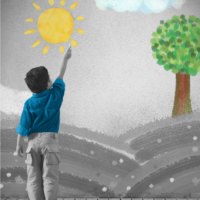Sold out.
The physical space that a child interacts with can play a significant role in their mental health, increasing connectedness and relationships. Creating positive therapeutic physical environments can be achieved with any existing space, even on the smallest of budgets, right through to those who are designing a new space.
- How can the interior and exterior of a care home help children feel calmer, happier, healthier?
- Does the design of a school classroom increase wellbeing, and maybe therefore learning?
- How can a CAMHS waiting room or clinic room make visiting CAMHS feel more supportive, welcoming and relaxing?
Just three of the questions that will be answered at this Twilight event hosted by our Scottish Branch. Learn more about what the branch has to offer in this podcast with Branch Chair Dan Johnson as he discusses Trauma and ACE’s.
Quick links about the event
Key takeaways
Who should attend
Prices and booking
About the speakers
Programme
Key takeaways
- An understanding of what the theory says about how to create therapeutic environments
- Knowing what the latest evidence says is effective in making space and environment therapeutic
- Taking practical examples and ideas of how this can be done in ‘real-world’ settings.
Who should attend
The event for child and youth care carers, education staff, inpatient staff, anyone that works within a physical environment with children: from the care home to the classroom to the clinic!
Prices and booking
This event is £10 for ACAMH Members, £10 for Students, and £25 for Non-Members.
Ways to book;
- Online via the button above,
- Complete and return the Creating Therapeutic Physical Environments Booking Form
- If you want to be invoiced we must have a Purchase Order number for us to be able to raise an invoice, please email events@acamh.org for details
About the speakers

Valerie is a Project Director with Snook. Her core focus is on co-designing person-centred services: involving those seeking, accessing and providing services in improving service delivery and experiences. She has a PhD in Healthcare Service Design and is motivated by creatively addressing the challenges associated with engaging diverse groups of stakeholders in co-producing services across complex service ecosystems. Her motivation is to make services more efficient, effective and equitable, with a specific interest in the role that digital can play in extending access to services. She has worked on a range of projects for Scottish Government, Department of Health, Department of Work and Pensions, Department for Education, NHS24 and various local authorities and third sector groups.

Edward Edgerton is a Reader in Psychology at the University of the West of Scotland. He is an experienced researcher in environmental psychology and his research focuses on the relationship between environmental design and wellbeing. He has played a leading role in a wide range of environment-behaviour projects including; environmental design within a psychiatric hospital, the role of the learning environment in the educational process and dementia friendly design in care homes. He was President of the International Association of People-environment Studies from 2012 until 2014.

Diarmaid is Director of Place at Architecture and Design Scotland. He is a designer with over 20 years experience of crafting stories, services and spaces to support stronger communities. Diarmaid is a facilitator, designer, educator and communicator. He speaks and writes on creative approaches to making better places.

Project Soothe: Images and Mental Wellbeing
Stella Chan is a clinical psychologist specialised in children and young people’s mental health. Based at the University of Edinburgh, her research, such as the Emotional Vulnerability in Adolescence (EVA) Study and Project Soothe, explore risk and resilience factors for young people’s mental health as well as new ways to boost wellbeing. She is a strong champion for the importance of involving the public in research and was the recipient of the British Psychological Society Public Engagement and Media Award 2018.

Stuart has worked in a wide range of policy, academic and research settings since completing his PhD at the University of Dundee. For the past five years, he has led a number of research projects in health and social care at Iriss, a research and innovation charity that supports the social services workforce in Scotland. Currently he is Head of Delivery, overseeing project activity within the organization.
Following his doctoral studies, Stuart worked in the Office of the Chief Researcher at the Scottish Government, where he acted as a liaison between higher education and third sector agencies. He subsequently took up the position of Research Associate at the University of Sheffield connecting research interests in community and well-being. In this role, Stuart was the impact and knowledge exchange link between social science academics and private and public sector organizations.
Stuart’s PhD thesis explored the relationship between mental health well-being and the therapeutic potential of natural environments. He continues to retain an interest in the geographies of emotional and social well-being. His research endeavours focus on qualitative practice-based methods and he is dedicated to person-centred approaches to research, as well methods based on coproduction and enquiry-based principles.
Programme
18:00 – 18:10 ACAMH Scotland Branch Chair Dan Johnson introduces the evening
18:10 – 18:30 Dr. Stuart Muirhead – Themes of therapeutic environments
18:30 – 18:50 Diarmaid Lawlor – Therapeutic Design
18:50 – 19:10 Dr. Valerie Carr – Restorative environments. Designing space with those who use it? Staff stress and wellbeing.
19:10 – 19:30 Dr. Eddie Edgerton
19:30 – 1950 Dr. Stella Chan – Interior design including a focus on images in the space

